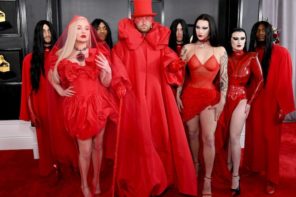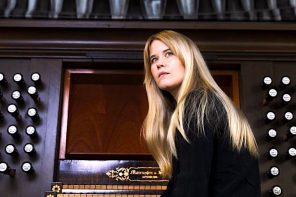Warning: the following video contains nudity and may not be suitable for younger folks. — ed.
Earlier this week, singer Erykah Badu released a video for her song, “Window Seat,” a catchy “Badu” ballad off her new album, New Amerykah Part Two (Return of the Ankh). The song itself has raised questions with many interpreting it as a love ballad in which Badu seemingly pushes her lover away only to bring him close. But those familiar with Badu’s music know better. In fact, the title alone tells us that Badu is up to something more—something both salvific and timely.
A complex protest song with a variety of meanings, “Window Seat” symbolically demands that society relinquish its hold on those trying to flourish in society—namely black women and girls. On the other hand it highlights a material need for others, including the oppressor. Meaning, although Badu pleads for a way out, a way to transcend the weight of social meanings, she also desires to be desired by those who seem to oppress her. Thus, while she wants to rise above their tactics, she is also caught up in their web.
Nonetheless, while the complexity of Badu’s lyrical content captivates the ear and the musical composition makes the heads of Badu fans bob rhythmically in response, it is not the soulful ballad that has made media heads spin out of control with (out)rage. It’s the video.
“Window Seat,” fashioned after an earlier video by dance punk duo Matt and Kim who stripped naked in Times Square in February 2009 as a liberatory act, shows Badu walking downtown Dallas where President John F. Kennedy was fatally shot in 1963, removing her clothing while singing in front unsuspecting onlookers of various ages and simulating “assassination” once completely naked. While Matt and Kim won MTV’s coveted “Breakthrough Video” award for creativity and direction, Badu has become somewhat of a despised prophet. Meaning, as predicted in her video, her subjectivity has been “assassinated” by public rage.
Many news outlets have suggested that she should be arrested or fined for indecent exposure, which the Dallas police have now done, citing her for disorderly conduct. I get that. There are rules that govern our society to which we must either abide by or pay the cost. However, the immediate move towards discipline and punishment—while Badu’s video is seemingly on a loop in the background of the newsroom—speaks to a much larger issue: the loss of control of black bodies that have historically been regulated through both verbal and visual representations.
This reality cannot be ignored. Historical ideas on race and gender have viciously consumed black subjectivity, chewed it up and spit it out as a new creation—a market piece with a mythical identity, name and meaning. These ideas cross-pollinate the social-cultural landscape. Thus, the emphasis on controls and penalties highlight the social need to keep black female bodies captive, at minimum to the confines of racist and sexist imaginations, which mark black women as both repulsive and fascinating simultaneously.
Some even imagined taking things into their own hands. Rebecca Lewis, a middle-aged white woman interviewed by CBS news who witnessed the production said, “I was thinking about going down there and whoopin’ her…but I was on the phone with the police, too…I called the police…I was very offended. There were too many kids, women, and children down there.”
While I am sure that Lewis was concerned about Badu’s nudity in front of the other “women and children,” I imagine she was equally uneasy about the implications of reproducing the violence of slavocracy in a post Civil War society. In short, not only would she have been arrested, Badu, who Lewis implies was not a “woman”/lady, would have likely fought back on a variety of levels. If nothing else, Lewis’ desire to “whoop” Badu reflects a rupture to a particular sort of racist imagination as well as a desire to put Badu back in “her” place. Perhaps if Lewis had things her way, Badu (and all other black folk) would be back on plantations.
What is interesting about this dynamic is that female nudity is blasted into our faces through various technologies day in and day out. Black female nudity, in particular, is made visible to the point of erasure. Meaning, social ideas are so forceful that they often replace individuality. Thus, Lewis’ “concern” for the “women and children” is laughable at best. The reality is, her gaze (as well as the others in the media) is tainted. We see not with our eyes but with the data of our psyches. Thus, what Badu saw as a liberative act, was re-encoded by a historical meta-narrative whose language, structures of thought, ideas and fantasies about black womanhood are already scripted.
However, this makes no difference to Badu. Not only will her album sales spike adding to her personal bottom line, she is nonetheless steadfastly “evolving” towards personal “liberation,” a “self” unhindered by social meanings, homogeneous stereotypes, social demands and cultural policing. With every garment removed, Badu symbolically rid herself of the mythical layers of “black womanhood” that have tormented black female subjects for centuries. In addition, she re-appropriated the material markers of the packaged “Badu.” Thus, while she needs to be watched and desired, at minimum for her career to thrive, going forward it will be on her terms.
I personally find this web of complex representations liberating. “Window Seat” acknowledges the power of and pleasure within the gaze while simultaneously transcending the violence of the former and enjoying the latter. It gives us an inside peek at Badu’s journey towards her interior, pre-signified self—a place of complete vulnerability where she is able to absorb the things in life that are life giving for her. Thus, in my estimation, “Window Seat,” with all of its concerns, is sacred. Shot without permits, permission, a script or outside direction, at a national landmark reserved for our beloved fallen President, Badu creatively mixes her blood narrative with his, thus disrupting all sorts of “party” lines.
To be sure, Badu is intentional in every way. The fact that this is Holy Week, a week that commemorates the week leading up to Jesus’ crucifixion, should not go unnoticed. As Badu’s album title signifies (New Amerykah Part Two), she longs for a new day in a more inclusive America that makes room for her particular complex, multi-positioned inter-subjectivity. In many ways, this reflects the message of Christ. While many will say that Badu is not Christ (myself included), her journey towards her individual “truth,” which she predicted would get her “killed,” should be re-read in light of his love ethic.
Perhaps if we better understood that, if we were all courageous enough to remove the emperor’s clothes while “evolving” towards a space of complete vulnerability, we might—like Badu who is guided by the spirit and wisdom of the Ankh, a cross-like sign used in ancient Egypt as a symbol of life—find God in ourselves (and others) and love Her fiercely…




